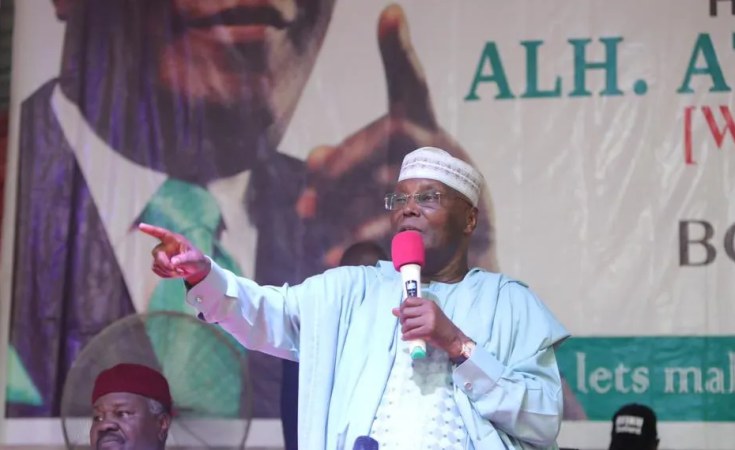PREMIUM TIMES worked with the Nigerian Fact-checkers Coalition to fact-check the claims of the candidates.
The candidates of the Peoples Democratic Party (PDP), Atiku Abubakar; New Nigeria Peoples Party (NNPP), Rabiu Kwankwaso, and Labour Party (LP), Peter Obi, featured on Sunday night at the presidential town hall organised by Arise TV in collaboration with the Centre for Democracy and Development.
It was the third series of the town hall, focusing on education, healthcare, poverty and human capital.
PREMIUM TIMES worked with the Nigerian Fact-checkers Coalition to fact-check the claims of the candidates, an innovative approach to help combat misinformation and promote credible conversations as Nigerians decide in 2023.
Here are the top fact-checks.
Claim 1:
CLAIM: PDP candidate Atiku claimed agriculture is the highest employer of labour in Nigeria.
FINDING: A report by PwC, titled Current State of Nigeria Agriculture and Agribusiness Sector, published in September 2020, described agriculture as the highest employer of labour in Nigeria. A recent report by the Food and Agriculture Organisation of the United Nations (FAO) disclosed that about 70 per cent of Nigerians also engage in Agriculture.
VERDICT: Correct
SOURCE: PwC Report and FAO
DATE: 04/12/2022
Claim 2
CLAIM: Labour Party's presidential candidate claimed that Nigeria's average life expectancy is 55 years and the global average, is 72.9 years.
FINDING: World Bank's latest (2020) data on life expectancy shows that Nigeria's average life expectancy is 55 years and the global average is 73 years.
VERDICT: Correct
SOURCE: World Bank
DATE: 04/12/2022
Claim 3
CLAIM: Mr Obi claimed that Nigeria is rated 163 out of 191 countries in the global Human Development Index (HDI)
FINDING: The United Nations Development Programme, UNDP, released the HDI Report for 2021/2022 in September and Nigeria is placed at 163 of 191 countries surveyed.
VERDICT: CORRECT
SOURCE: UNDP's Human Development Report 2022
DATE: 04/12/2022
Claim 4
CLAIM: Atiku said "when the PDP was in power, the poverty rate was not as high as this." The PDP ruled Nigeria between 1999 and 2015.
FINDING: The National Bureau of Statistics (NBS) in 2003/2004 put the poverty rate at 64.2 per cent; it dropped to 62.6 per cent in 2009/2010. In 2015, former President Goodluck Jonathan put Nigeria's poverty rate at 33.1 per cent, according to Daily Trust. This coincides with the World Bank's Nigeria Economic Report in 2014 which estimated that 33.1 per cent of the Nigerian population lived below the poverty line in 2012/2013. By November 2022, NBS reported that 63 per cent of persons living in Nigeria (133 million people) are multidimensionally poor.
VERDICT: Largely correct
SOURCE: National Bureau of Statistics/World Bank/Daily Trust.
DATE: 04/12/2022
Claim 5: The Labour Party's presidential candidate also claimed that Nigeria's education budget is less than 10 per cent in six years.
FINDING: A review of Nigeria's budgetary allocation to education between 2016 and 2021 shows that the federal government allocated less than 10 per cent to the ministry of education. The highest percentage the ministry got during the period was 7.9 per cent in 2016.
VERDICT: CORRECT
SOURCE: Budget Office of the Federation and Premium Times
DATE: 04/ 12/ 2022
Claim 6
CLAIM: Mr Obi claimed that education is among the three indices used to measure the human development index.
FINDING: A 2021 report by the United Nations Development Programme shows that the three basic dimensions to measure human development are: a long and healthy life, knowledge (education), and a decent standard of living.
VERDICT: CORRECT
SOURCE: UNDP
DATE: 04/12/2022
Claim 7
CLAIM: The former governor of Anambra state claimed that Nigeria's total health budget in the last six years is N2.25 trillion.
FINDING: A review of Nigeria's health budget in the last six years, between 2017-2022 shows that the federal government allocated N2.7 trillion to the health sector. However, If Mr Obi meant between 2016 to 2021, as he referenced earlier, Nigeria's health budget stands at N2.27 trillion.
VERDICT: Inaccurate
SOURCE: Budget office of the Federation and Premium Times Data
DATE: 04/12/2022
Claim 8: Mr Kwankwaso said he was repaying all the debts he accumulated at the time he was leaving as Kano State Governor in 2015.
FINDING: The Debt Management Office, DMO, statutorily keeps and publishes the official debt stock of Nigeria's federal government and states. According to publicly accessible DMO records, in 2011 when Mr Kwankwaso returned as Kano governor, the state's debt stock amounted to $59,777,994 (external) and N5.8 billion (domestic). He left office on May 29 2015 and in the DMO record as of 30th June 2015, Kano's external debt stock was $59,796,931. For domestic debt stock, the record as of 31 December 2014, five months before Mr Kwankwaso left office, says Kano was owing N31,423,625,015 and as of 31 December 2015 after he left office 65,007,329,454. Official records, therefore, show that Mr Kwankwaso left debts as he exited the office. Two days after he left office on 31 May 2015, his successor and then ally, Abdullahi Ganduje confirmed Mr Kwankwaso left the state in debt.
VERDICT: FALSE.
SOURCE: Debt Management Office
DATE: 04/12/2022
CLAIM 9: Peter Obi said Nigeria has passed India in infant mortality rate
FINDING: According to the World Bank database, Nigeria has the worst infant mortality rate, surpassing India in the global index. Nigeria's infant mortality rate is 72/1,000 live births while India's is 27/ 1,000.
VERDICT: Correct
SOURCE: World Bank
DATE: 04/12/2022


